Kentucky Last Will and Testament Form
A Kentucky will is a crucial legal instrument that represents the final wishes of a testator (the document’s creator) with regard to their personal property and how they’d wish it to be distributed to their selected heirs. A thought-out and properly drafted last will can be vital to those you love upon your death, even if you haven’t got lots of assets.
Below, you’re able to download a free Kentucky last will and testament form that you can fill out and print. In addition to that, you will find recommendations regarding the last will preparation process and a table with state requirements and laws.
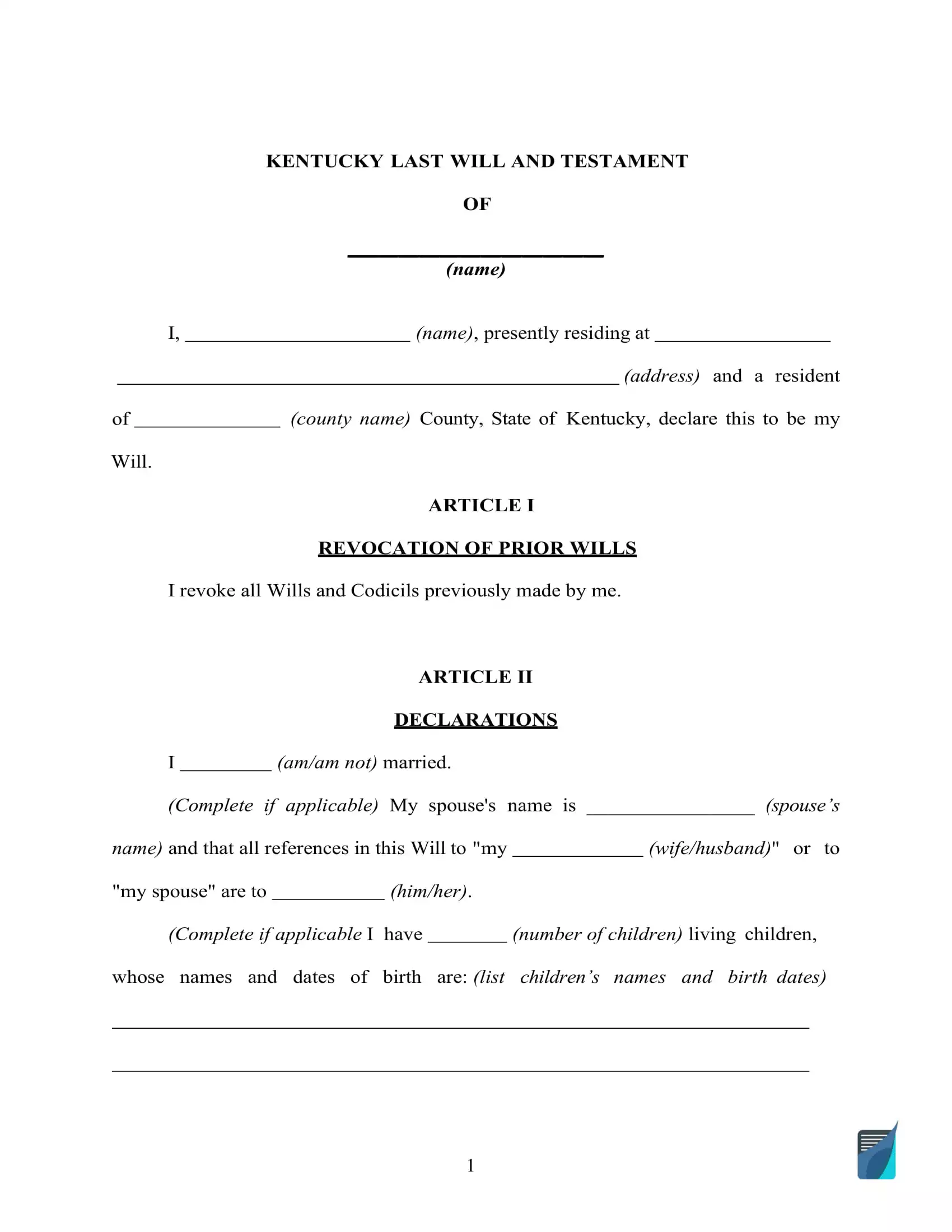
Build Your Document
Answer a few simple questions to make your document in minutes
Save and Print
Save progress and finish on any device, download and print anytime
Sign and Use
Your valid, lawyer-approved document is ready
Kentucky Will Laws and Requirements
| Requirements | State laws | |
| Statutes | Chapter 394 – Wills | |
| Definition | 394.010 “Will” defined | |
| Signing requirement | Two witnesses | 394.040 Requisites of a valid will |
| Age of testator | 18 and older with a few exceptions | 394.020 Persons competent to make , 394.030 Minor can make will, when |
| Age of witnesses | 18 and older | 394.040 Requisites of a valid will |
| Self-proving wills | Allowed | 394.225 Self-proved will |
| Handwritten wills | Recognized under certain circumstances | 394.040 Requisites of a valid will |
| Oral wills | Not recognized | |
| Holographic wills | Recognized under certain circumstances | |
How to Write a Last Will in Kentucky
Below are seven general steps that are usually involved in making a will in the state of Kentucky. We also provided some of the screenshots from our template so that you could have a reference.
1. Think about your possible choices. One thing to consider is whether you wish to write the whole thing by hand or use a last will and testament form with fillable fields. We recommend using the latter as it already contains most of the general legalese and you just need to fill in the blanks. You can also try our document maker, special software that will guide you through the whole process step-by-step to make will creation a bit easier for any Kentuckian.
2. Specify your details. Fill in your full legal name and address (the city, county, and state of residence) to establish the testator of the last will and testament. Reread the remaining portion of the passage, including the details you’ve entered.
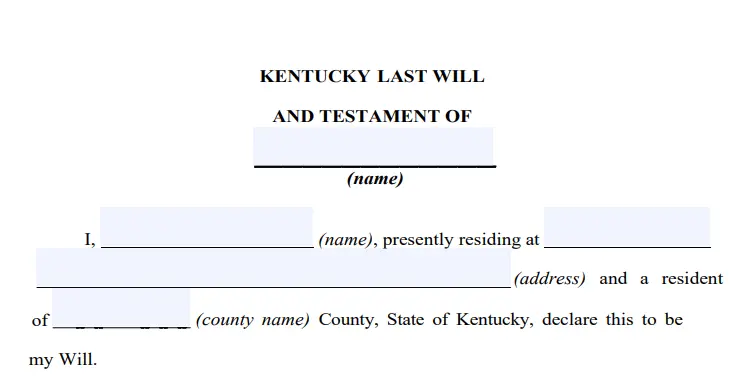
3. Establish the executor (or executrix). In this passage, you determine who’ll execute your last will and testament by entering their full name, along with their city, county, and state of residence. Nearly all states have specific policies concerning out-of-state agents (KY 395.005) and executors, which typically suggests significantly more headache and red tape. For that reason, it’s recommended to appoint somebody who lives in the same state as you. It could happen that your main representative won’t be able to carry out your will because of a sickness, death, unwillingness, or some other reasons. In this situation, the court will probably choose its own representative to handle the duties. In order to avoid that, you can select another executor by indicating the same particulars you did for the main one.
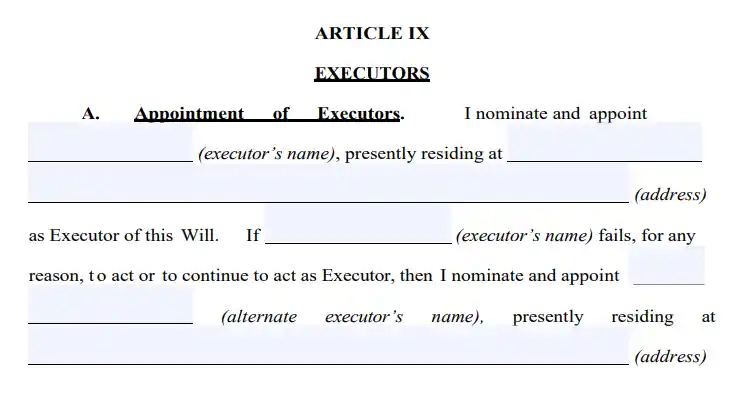
4. Establish the guardian (optional). It’s possible to specify a trusted person as a guardian if you have minor or dependent children that need to be looked after. If there are no directions pertaining to who should take care of your kids, the guardian will be chosen by the court, which is not ideal in many cases.
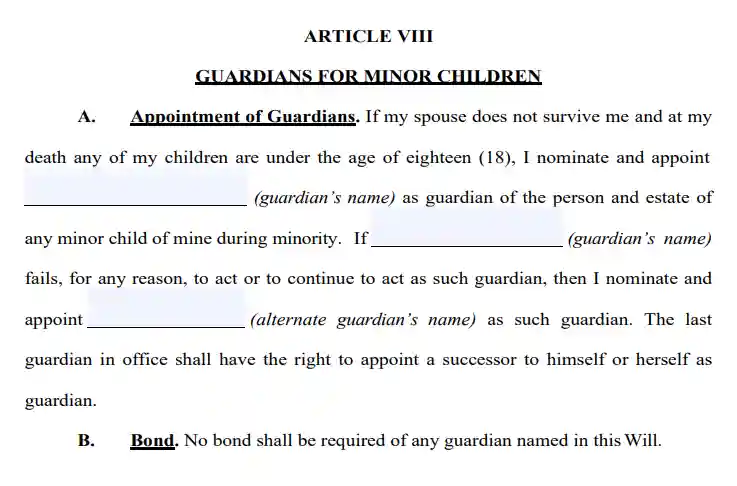
5. Indicate your beneficiaries. At this point, establish those to whom you want to bequeath your property and assets, that is, your beneficiaries. For every inheritor, fill out the next details: full name, address, and the way they are related to you. A charitable organization can also be among your beneficiaries.
6. Allocate possessions. You can specify which of your respective inheritors gets this or that piece of property. If you don’t, the assets will be divided evenly amongst the inheritors. Please notice that there are things that can’t be distributed in your will, such as life insurance and joint assets.
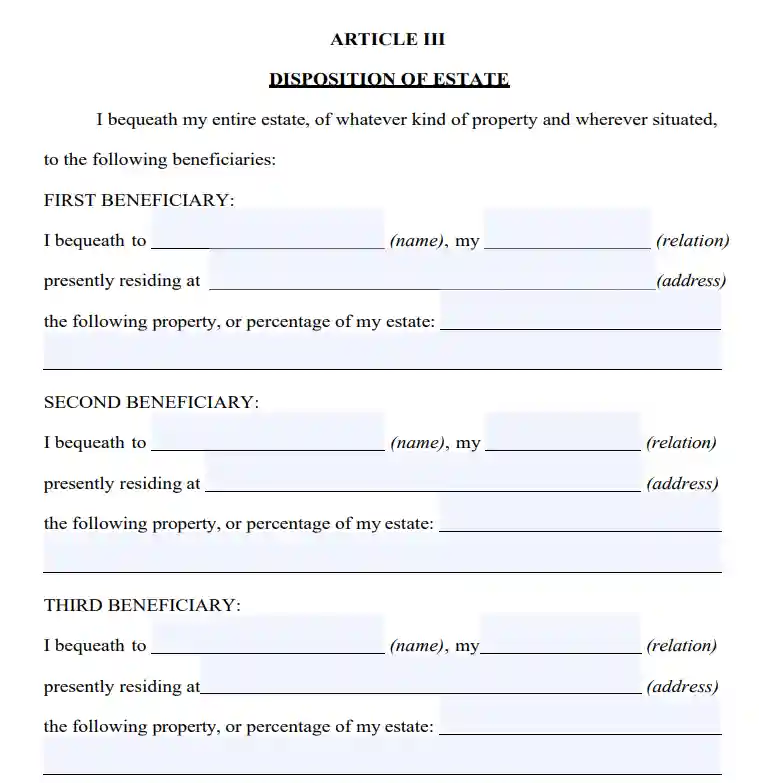
7. Ask witnesses to sign the document. Kentucky rules (394.040) stipulate that no less than two witnesses have to sign a last will and testament for it to be regarded as legally binding. Only somebody who isn’t your named beneficiary and is of 18 years or older could be picked as a witness. As a possible added safety measure against situations when your will is contested or some other problems, it’s a wise idea to name a witness who is younger than you to make sure they’ll still be around after you pass away. After a complete revision of each paragraph in your last will and testament, all signatories (you and your two witnesses) will have to fill out their names and full addresses and sign the will. If you’d like to notarize your will, you might also want to make it self-proved, to make the probate process a bit easier for your family.
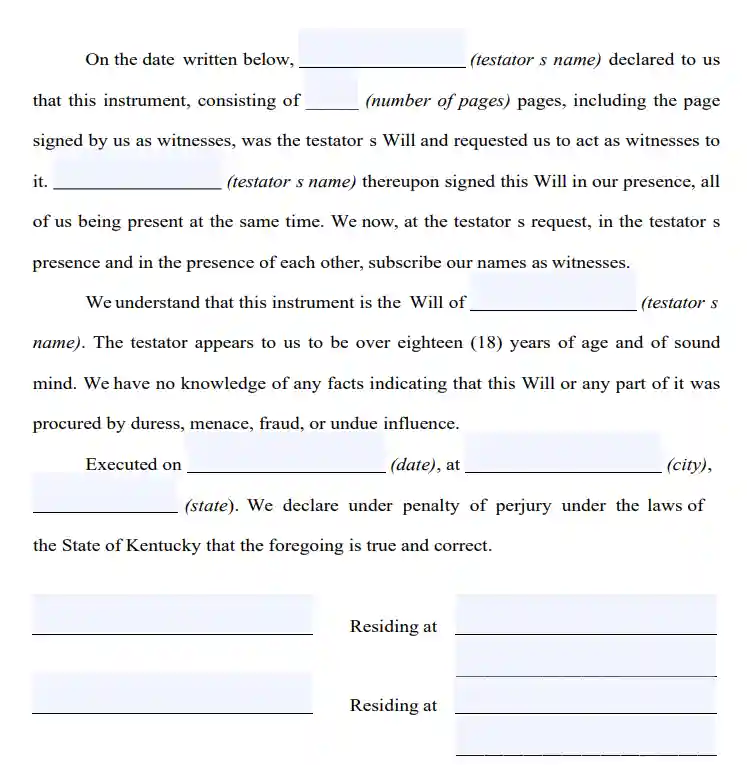
Make a Free Kentucky Last Will and Testament with Ease
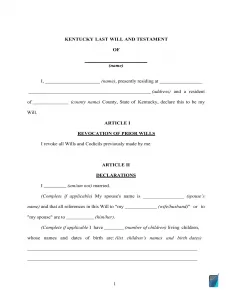

Frequently Asked Questions
Is last will notarization needed by Kentucky law?
In Kentucky, a will is valid without having a notary public certify it.
What is testamentary capacity?
In order to make a legally valid will in KY state, you must be at least 18 years old and have “testamentary capacity,” which implies you must be mentally sound and fully comprehend:
- The reason for having a last will document in place.
- The fact that you’re drafting a will.
- The type of property you possess and the size of it.
- Who you would trust with your belongings (your beneficiaries).
Does a last will demand a self-proving affidavit in Kentucky?
In line with Kentucky law, there’s no need to attach a self-proving affidavit to your last will and testament. However, it will serve you well to include this document. In the course of probate, it can act as a substitute for the witness testimony in court and ease the procedure.
Is spouse disinheritance allowed?
In this state, you can’t disinherit your marriage partner, and even if you try, the law ensures that your spouse gets some share of your estate (KRS Chapter 392). In most jurisdictions, estate and probate rules protect spouses, which applies to Kentucky as well.
Can a signed last will be altered later on in Kentucky?
Yes, it can be altered. A codicil, which is a small addendum that must be signed the same way as a will to be effective, can be added to a Kentucky last will and testament at any point before the testator’s death. If you want to change many things, it is recommended to write an entirely new will.
How can a physically challenged individual sign their will?
Solely per your instruction and with you present is someone allowed to sign your last will and testament. It’s possible to give a certain directive via a number of ways, which include voice communication, a positive response to a question, or a gesture. However, your beneficiaries cannot sign on your behalf nor be your witnesses.
| Related documents | When to make it |
| Codicil | There are several minor modifications you want to make to your will. |
| Self-proving affidavit | You want to save time and legal fees for your will’s witnesses. |
| Living will | You would like to make sure that, if you’re incapacitated, you get treated exactly how you’d want to. |
| Living trust | You want to handle your end-of-life matters without probate. |
Last Will and Testament Forms for Other States
